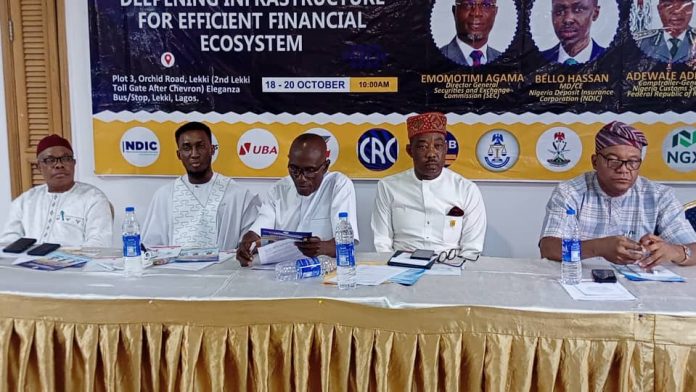The Financial Inclusion and Business Optimization Program (FIBOP) workshop, held at Orchid Hotels in Lekki from October 18-20, concluded with a call for crucial reforms aimed at strengthening Nigeria’s digital and financial infrastructure. Under the theme “Digital Innovation: Deepening Infrastructure for an Efficient Financial Ecosystem,” the event gathered leaders from Nigeria’s banking, maritime, oil and gas sectors, alongside representatives from the Nigeria Customs Service (NCS), to discuss innovative solutions for expanding financial access and improving operational efficiency.
A key resolution from the workshop focused on establishing a homegrown financial infrastructure capable of integrating Nigeria’s estimated N36 trillion informal sector. Stakeholders emphasized that this move would support the government’s financial inclusion efforts, which are crucial for stimulating economic growth. Additionally, participants recommended that the government take steps to expand credit access for the informal sector by reducing credit costs, thereby boosting internally generated revenue.
Energy sustainability emerged as another focus area, with stakeholders proposing that Nigeria’s ports along the Atlantic Ocean invest in hydro and gas energy infrastructure. Such investments, they argued, would enable the ports to generate their own electricity, reducing reliance on the national grid and supporting Nigeria’s push for self-sufficiency in energy.
The NCS’s ongoing digitization initiatives were also recognized as central to streamlining trade processes, with stakeholders advocating for the integration of all customs-related operations onto a unified digital platform. This modernization effort, they argued, would improve revenue generation and efficiency. Similarly, the banking sector was urged to enhance digital infrastructure in collaboration with the Ministry of Communications and Digital Technology, banks, and relevant government agencies. Improved infrastructure would lower operational costs and enhance transaction efficiency across financial institutions.
In a bid to fortify trade security and efficiency, stakeholders called for the Nigeria Customs Service to sustain its Authorized Economic Operator (AEO) program, in line with the World Customs Organization (WCO) SAFE Framework. Additionally, systems like NICIS II were noted for their effectiveness in expediting import and export procedures by streamlining documentation, providing real-time duty assessments, and simplifying payment processes.
A public-private partnership approach was recommended to support the NCS modernization project, allowing for advanced technologies to be adopted without overburdening the national budget. The importance of cybersecurity was also highlighted, with participants urging careful management of associated risks and costs to protect the digital gains achieved.
Further recommendations included automating import duty collection to minimize manual errors and reduce processing delays, and conducting needs assessments to ensure that financial services align with public expectations. To address specific technological needs in Nigeria, an ICT-focused study group was proposed to lead research and guide solution development.
On network reliability, stakeholders urged the Nigerian Communications Commission (NCC) to work toward minimizing downtime, aligning Nigeria with international standards and ensuring that critical communications remain uninterrupted.
The FIBOP workshop closed with a unified commitment from attendees to drive these strategic initiatives forward. The communique underscored the necessity of collaboration between government agencies, private sector leaders, and technology providers in building a robust, digitally advanced, and financially inclusive future for Nigeria.




